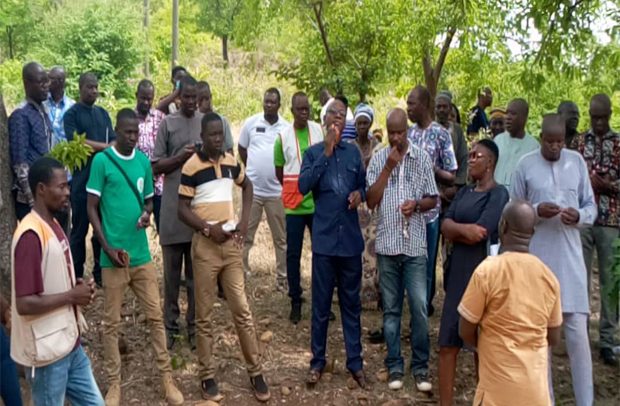Stakeholders monitoring some reclaimed vegetation
As the effects of climate change continue to threaten human existence and comfort, many government and non-governmental organisations continue to search for diverse approaches and strategies to tackle the threats of climate change around the world, with the hope of reducing the impact of the effects.
Ghana has had its share of the effect of climate change across her regions and districts, where persons whose livelihoods depended on farming are suffering because of unpredictable rainfall patterns and water bodies drying up faster, thereby hindering dry season farming and animal farming.
Many sectors of human and animal lives, as well as Ghana’s economy have been affected by the worsening climate change conditions, hence the urgent need for quick and sustainable actions to halt or reverse the situation.
In Ghana, World Vision Ghana is implementing an initiative dubbed, “Farmer Managed Natural Regeneration” with the involvement of some local farmers in six districts in the Upper East Region, to tackle deforestation and hunger, as well as improve wildlife and food security.
Farmer Managed Natural Regeneration (FMNR) was first implemented in the Talensi District in the Upper East Region in 2009, where more than 70 hectares of land were acclaimed for the natural growth of trees and other species. The project, after recording a successful outcome, got World Vision Ghana to extend the implementation to five more districts, including Binduri, Kassena-Nankana West, Bawku West, Garu and Tampane, all in the Upper East Region.
Speaking to some beneficiary farmers in some of the beneficiary districts during a recent monitoring tour, almost all respondents noted that the initiative has not only improved their social lives, but has given them access to nutritious fruits and assured food security.
Abantanga Samuel, one of the beneficiary farmers in Talensi District, said, through the initiative, his community members have initiated bee farming to improve their incomes.
“… through this initiative, we are now harvesting honey here in our community forest. In this forest, we don’t allow bush burning, cutting of trees, or mining. So, we are grateful to World Vision Ghana for introducing this initiative to us in 2009. Now, our women don’t struggle for firewood, our children eat natural fruits from the trees in the forest.”
Speaking at a Regional Public Policy Stakeholders Advocacy conference for the scaling up of the Farmer Managed Natural Regeneration in the Upper East Region, Samuel Abasiba, Project Manager at World Vision Ghana called on district assemblies to enforce bushfires by-laws and organise communities to prevent and control indiscriminate bushfires.
He called on the various stakeholders especially, regional and district policy makers to make a case for the project in the National Environmental and Agroforestry Policy Reforms.
“FMNR has proven more effective than conventional tree planting, afforestation and land restoration programmes in many parts of the world where it has been adopted.
“We believe that it has the potential to help central government and local government authorities to achieve their targets of restoring the degraded Northern Savannah Ecological Zone, which is prone to drought and desertification under various land restoration commitments,” Mr. Abasiba added.
Some of the District Chief Executives at the stakeholders’ conference who joined the field tour assured that they will begin implementing similar initiatives in their catchment areas.
District Chief Executive for Zebila West, Tahiru Issahaku Ahmed, indicated that he will partner with World Vision Ghana to implement the initiative in the drought-prone areas in his district.
According to him, the project will bring back the lost forest cover of the country, especially the Upper East Region that has been battling with drought for years.
“… coming to this community to witness this natural green forest is an indication that it is possible for us here in the region to restore our vegetation. And I can assure you all that, I will partner with this organisation to start similar projects in some of the communities in my district. We need to embrace it and begin protecting our forest cover,” Tahiru Issahaku said.
From: Ebo Bruce-Quansah, Talensi


